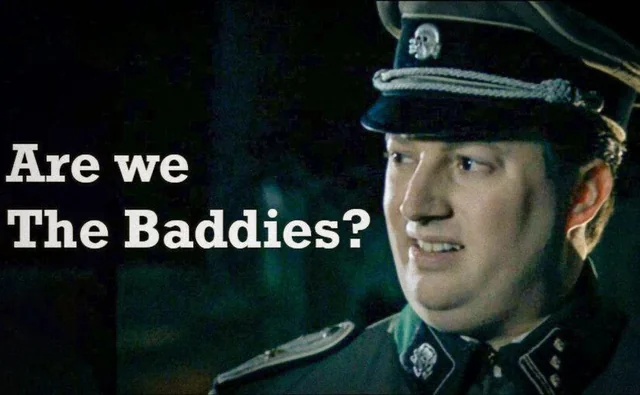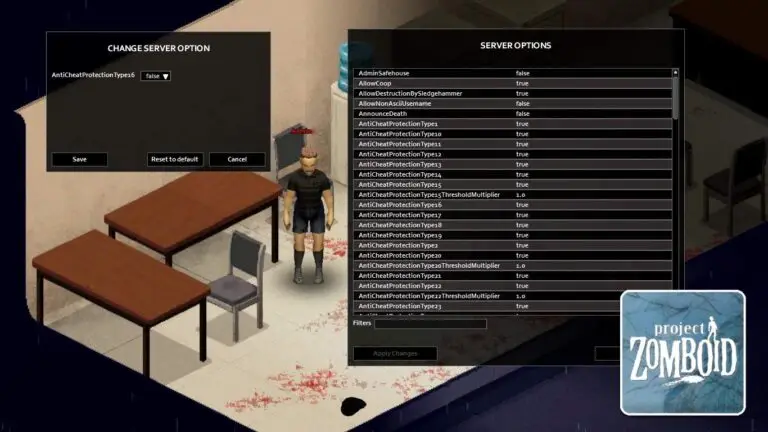
Introduction to “Are We the Baddies”
The phrase “are we the baddies“ has carved its niche in the online and cultural landscape as an enduring meme and thought-provoking question. Originally stemming from a comedic skit by the British TV show That Mitchell and Webb Look, this phrase has evolved far beyond its initial appearance, touching on themes of self-awareness, morality, and irony.
The Origin of “Are We the Baddies”
The TV Sketch That Started It All
That Mitchell and Webb Look, a BBC sketch comedy show starring David Mitchell and Robert Webb, first aired the memorable skit in which two Nazi officers, played by the show’s leads, question their moral alignment. As one character looks at their skull-adorned uniforms, he asks with genuine puzzlement, “Are we the baddies?” This moment, intended for satire, emphasized the absurdity of evil entities failing to recognize their own status.
Why the Phrase Resonated Globally
The skit gained viral attention because it humorously highlighted a common human blind spot: the inability to self-reflect critically. Audiences saw this moment as a poignant critique of ideologies and groups that operate under a sense of unquestionable righteousness while engaging in actions that might contradict their supposed ethics. The comedy became a mirror for introspection, prompting individuals and societies to ask, “Are we the baddies?” whenever faced with potentially unethical actions.
The Phrase’s Journey to Internet Fame
Memes and Online Culture
Once the internet took hold of the sketch, the line “are we the baddies” was immortalized as a meme. It started to appear in various contexts, used to point out hypocrisy, moral contradictions, or situations where the “good guys” might not be so good after all. Memes featuring this phrase often accompany images or scenarios highlighting moral irony, turning it into a catchphrase for nuanced critique.
Adaptation Across Platforms
Platforms like Twitter, Reddit, and Facebook amplified the reach of the phrase. Users often use it in discussions related to politics, corporate behavior, or any topic involving ethics and power dynamics. Its adaptability made it more than just a meme; it became a shorthand for pointing out situations where power might come with overlooked ethical implications.
Deeper Meanings Behind “Are We the Baddies”
Psychological Implications
The question taps into a fundamental aspect of human nature: the struggle between self-perception and reality. In cognitive psychology, self-serving bias often leads people to justify their actions as right or necessary, even when they may be detrimental or morally ambiguous. The popularity of this phrase reflects society’s increasing awareness of how power, authority, or even personal beliefs can cloud moral judgment.
The Role of Irony and Satire
Satire has long been used to highlight societal issues through humor and exaggeration. The “are we the baddies” skit exemplifies this, using an extreme historical setting (Nazi Germany) to make a broader point about the dangers of moral blind spots. When irony like this hits home, it pushes audiences to reconsider and reevaluate their own beliefs or the systems they support.
Real-World Applications of the Concept
Corporate Responsibility
In business, leaders may find themselves asking “are we the baddies?” when they confront ethical dilemmas. Companies that prioritize profit over ethical behavior, such as exploiting loopholes, disregarding environmental impact, or ignoring labor rights, can easily become “the baddies” without intending to. The phrase serves as a reminder for organizations to introspect and align their practices with their stated values.
Political and Social Implications
Politics is another realm where this question finds deep relevance. Policies, actions, or stances that outwardly promise progress but come at the cost of certain groups’ well-being often face scrutiny under this lens. In recent years, discussions about international relations, climate change policies, and systemic inequalities have invoked the spirit of “are we the baddies?” as citizens worldwide push for more accountability and fairness.
Why This Phrase Stays Relevant
Timelessness of Moral Questions
The simple yet powerful question endures because it resonates with a timeless struggle: defining what is right versus wrong. As societies evolve, so do the complexities of moral landscapes. The phrase encourages individuals and collectives alike to engage in critical self-reflection, asking hard questions and seeking honest answers.
The Universality of Introspection
The reason behind the phrase’s viral success lies in its ability to cut across cultures and situations. Whether in leadership, everyday life, or media, the tendency to cast ourselves as the “heroes” of our stories can lead to unintended consequences. Recognizing when actions may be veering into harmful or hypocritical territory is crucial for growth, making “are we the baddies?” a question that everyone can relate to at some point.
Cultural Reflections: Modern Takes on the Meme
Art and Media Commentary
Various forms of media have adopted this theme to underline narratives about flawed protagonists or complex villains. Shows like Breaking Bad and The Sopranos engage audiences by forcing them to empathize with characters who, in conventional terms, might be considered “the baddies.” These stories thrive on the conflict between the characters’ self-image and their actual impact on the world around them.
Online Discourse and Social Movements
The meme has become particularly poignant in online discourse surrounding activism and advocacy. Groups within movements sometimes use the phrase to check their own practices and ideologies, ensuring they don’t perpetuate the same issues they aim to dismantle. This type of introspection can prevent the development of echo chambers and encourages inclusive, ethical activism.
Memes That Echo Moral Ambiguity
Memes as Modern Storytellers
Memes act as digital folklore, succinctly conveying complex ideas through humor and imagery. The “are we the baddies” meme has achieved this by becoming a tool for social commentary that points out ironies and contradictions. It’s not just a funny clip—it’s a social mechanism that reflects the modern appetite for irony mixed with moral questioning.
The Power of Sharing Perspectives
The internet thrives on shared experiences and collective consciousness. The meme’s popularity underscores society’s current mood of skepticism and the urge to question authority and established norms. It’s a reminder that self-examination can lead to meaningful discussions and actions, sparking debate in a world that often needs it.
Lessons Learned from “Are We the Baddies”
Critical Thinking as a Cultural Tool
The question serves as a simple yet profound reminder that self-reflection is essential for ethical behavior. It’s easy to label others as villains and consider one’s own actions justified. However, this mindset can lead to harmful groupthink. Using humor as a starting point, “are we the baddies?” encourages thoughtful, ongoing dialogue about ethics and accountability.
Embracing Uncomfortable Realizations
True growth comes from admitting flaws and re-evaluating positions. The popularity of this meme highlights a collective willingness to reconsider assumptions, acknowledge shortcomings, and strive for better practices, whether at an individual or organizational level.
FAQs
What is the origin of the phrase “are we the baddies”?
The phrase originated from a sketch on the British show That Mitchell and Webb Look, where two Nazi officers question their moral alignment.
Why is “are we the baddies” popular online?
It resonates as a meme because it humorously points out moments of hypocrisy or unintended self-incrimination, making it relatable in discussions of ethics, power, and ideology.
What does the meme signify?
It signifies a call for self-awareness and critical thinking, encouraging individuals and groups to reflect on whether their actions align with their perceived values.
Can the phrase be applied in real life?
Yes, it’s often used in contexts where businesses, political movements, or individuals need to reassess their actions to ensure they are ethically sound.
How did the meme influence pop culture?
It has influenced pop culture by providing a way to question moral ambiguity in shows, movies, and discussions, supporting narratives that showcase flawed protagonists.
Is “are we the baddies” a form of satire?
Absolutely. It is rooted in satire, using humor to critique the failure to recognize one’s own moral or ethical shortcomings.


